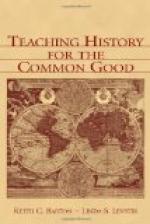The author’s suggestions will, therefore, be of distinct value to at least two groups of history teachers. Those who believe in the larger uses of history teaching, so much argued of late, will find here the procedures that will express the ideals and obtain the results they seek. Those who are not yet ready to accept modern doctrine, but who feel a keen discontent with the older procedure, will find in these pages many suggestions that will appeal to them as worthy of experimental use. It may be that the successful use of many methods here suggested may be the easy way for them to come into an acceptance of the larger principles of current educational reform.
THE TEACHING OF HISTORY
I
SOME PRELIMINARY CONSIDERATIONS
Assumptions as to the teacher of history
This monograph will make no attempt to analyze the personality of the ideal teacher. It is assumed that the teacher of history has an adequate preparation to teach his subject, that he is in good health, and that his usefulness is unimpaired by discontent with his work or cynicism about the world. It is presupposed that he understands the wisdom of correlating in his instruction the geography, social progress, and economic development of the people which his class are studying. He is aware that the pupil should experience something more than a kaleidoscopic view of isolated facts. He recognizes the folly of requiring four years of high school English for the purpose of cultivating clear, fluent, and accurate expression, only to relax the effort when the student comes into the history class. He knows that the precision, logic, and habit of definite thinking exacted by the pursuit of the scientific subjects should not be laid aside when the student attempts to trace the rise of nations. Let us go so far as to assume a teacher who is both pedagogical and practical; scholarly without being musty; imbued with a love for his subject and yet familiar with actual human experience.
Actual conditions confronted by the teacher
There are from one hundred and eighty to two hundred recitation periods of forty-five minutes each, minus the holidays, opening exercises, athletic mass meetings, and other respites, in which to teach a thousand years of ancient history, twenty centuries of English history, or the story of our own people. The age of the student will be from thirteen to eighteen. His judgment is immature; his knowledge of books, small; his interest, far from zealous. He will have three other subjects to prepare and his time is limited. Also, he is a citizen of the Republic and by his vote will shortly influence, for good or ill, the destinies of the nation.




